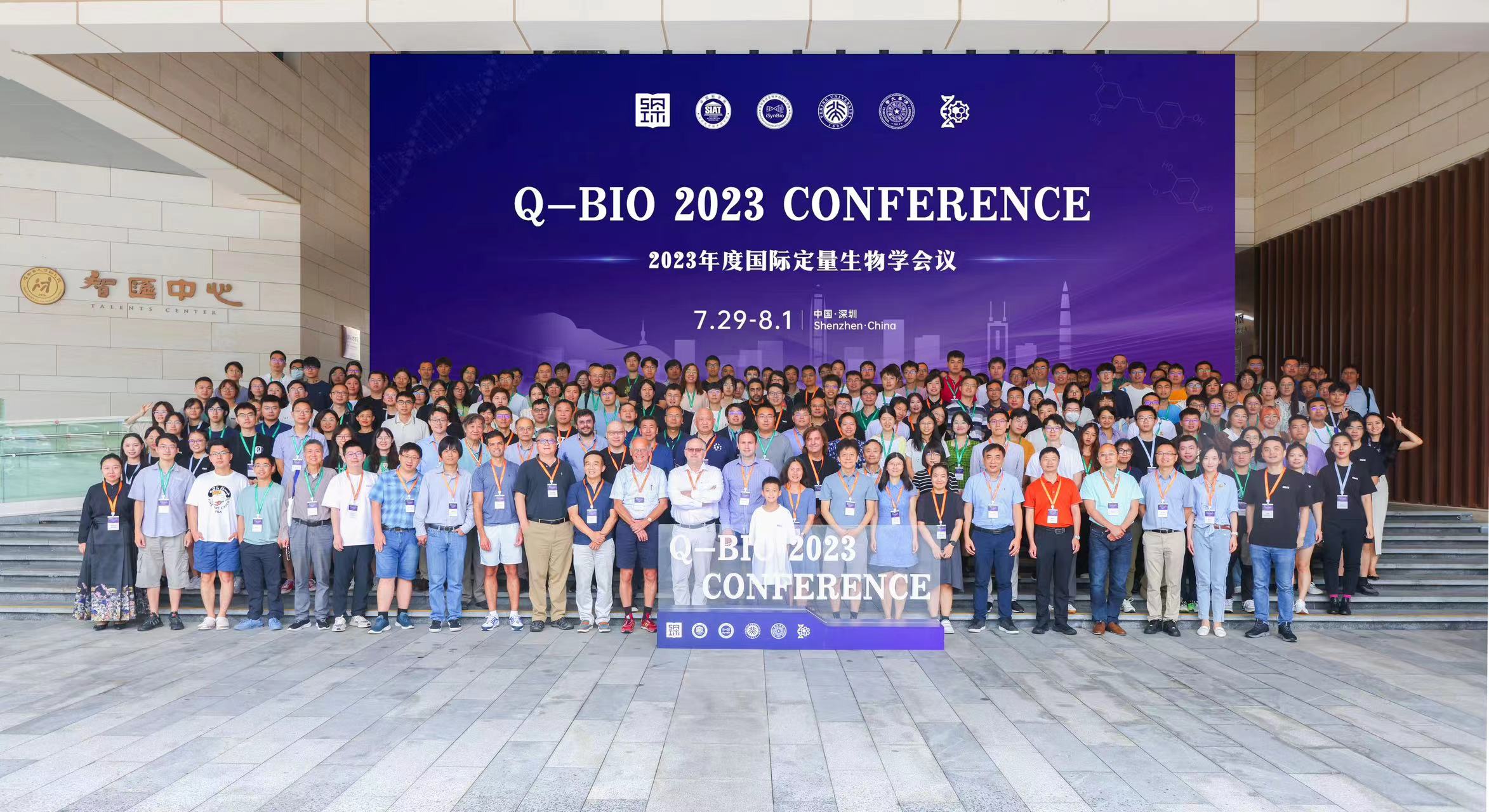
On July 30-August 1, the 17th Q-Bio International Conference on Quantitative Biology (hereinafter referred to as the “Q-Bio Conference”) was held in Shenzhen. About 40 experts and near 300 industrial scholars from over 20 higher education institutions of countries such as the United States, Germany, Denmark, Switzerland, Canada, Israel, India, Iran, and Japan gathered for a dialogue on the opportunities and future of quantitative and synthetic biology. The conference was co-hosted by Shenzhen Institute of Advanced Technology, Chinese Academy of Sciences, SIAT University (preparatory), Peking University, Tsinghua University, Shenzhen Institute of Synthetic Biology and Shenzhen Synthetic Biology Association, etc.

The attendees of the event pose for a photo
The Q-Bio Conference 2023 was held in an Asian country for the first time since its establishment 17 years ago. The domestic organizing committee of the event this year was headed by Liu Chenli, a research fellow with Shenzhen Institute of Advanced Technology. The academic event has invited and attracted lots of big names, such as professor Tang Chao from Peking University (an academician of Chinese Academy of Sciences), professor Ouyang Qi from Peking University (also an academician of Chinese Academy of Sciences), professor Terence Hwa from University of California San Diego (an academician with American Academy of Science), and professor Mogens H. Jensen from University of Copenhagen (former president of the Royal Danish Academy of Sciences). With the theme of “Quantitative Law and Prediction Model of Complex Living Systems”, the conference covered cutting-edge research in the fields such as genetic pathway design, metabolic network, microbiome, and artificial intelligence, where the latest achievements in the field of quantitative biology were shared and discussed in such forms as keynote speeches and presentations delivered by specially invited guests and poster displays.
At the beginning of the conference, researcher Liu Chenli from Shenzhen Institute of Advanced Technology extended a warm welcome on behalf of the hosting party to the experts and scholars, who expected that every attendee could share their wisdom with an open attitude in this Q-Bio Conference. He mentioned that at the forefront of basic disciplines, the science and technology community should continuously promote scientific openness and international cooperation to tackle and solve the common challenges facing mankind and major scientific problems in the world.
Then, the guests respectively delivered a report on topics such as “artificial life design”, “law of life omics”, “artificial intelligence”, and “microbial community” at an atmosphere of heated discussions at the site. The scientists from various fields at home and abroad exchanged views on scientific and technological achievements, looking into the future of fundamental science.
In the interview, Wei Ping, a researcher with Shenzhen Institute of Advanced Technology, said that synthetic biology was a typical frontier interdisciplinary subject, which was not only of great significance to our understanding of the essence of life, but also showed great potential and application prospects in such areas as medicine, energy, materials, agriculture, and environment. We should work together to create an exchange platform and an international environment for the interdisciplinary integration and development in Shenzhen.
Professor Mogens Høgh Jensen with the Niels Bohr Institute at the University of Copenhagen, said: “The speed of development in Shenzhen is amazing. Shenzhen is becoming a world-class innovative science and education center. There will be more and more universities, research institutions and startups in Shenzhen, especially in the field of biotechnology. I hope that teams from different countries can establish close cooperation to explore the integration of physics and biology."
Professor Tang Leihan from Baptist University of Hong Kong said, Shenzhen’s full-chain development model in the field of synthetic biology was very attractive, which could truly promote the development of the Greater Bay Area with its strategic foresight ranging from basic research to industrial transformation. The event had gathered a lot of researchers and top scientists sharing common goals. It was a rare opportunity for everyone to sit down and exchange views in an open environment. Hopefully, more cooperation projects can be implemented after this conference.
As a frontier interdisciplinary subject, quantitative biology reveals the design and working principles of biological systems by organically combining advanced measurement methods and theoretical modeling, and plays an increasingly important role in the research fields related with human health. Major scientific and technological breakthroughs are increasingly dependent on the integration of different disciplines. The comprehensive, systematic and permeable knowledge formed by the integration of disciplines can be used to effectively address new problems and new challenges, which has become an important way to make original and major achievements.
Accelerating the high-level self-reliance in science and technology is the only way to promote high-quality development. Facing the national strategic needs and major issues of scientific frontiers, this conference encouraged debates and discussions and promoted innovation and integration at the source to pursue the strategic goal of building Shenzhen into a highland of synthetic biology.